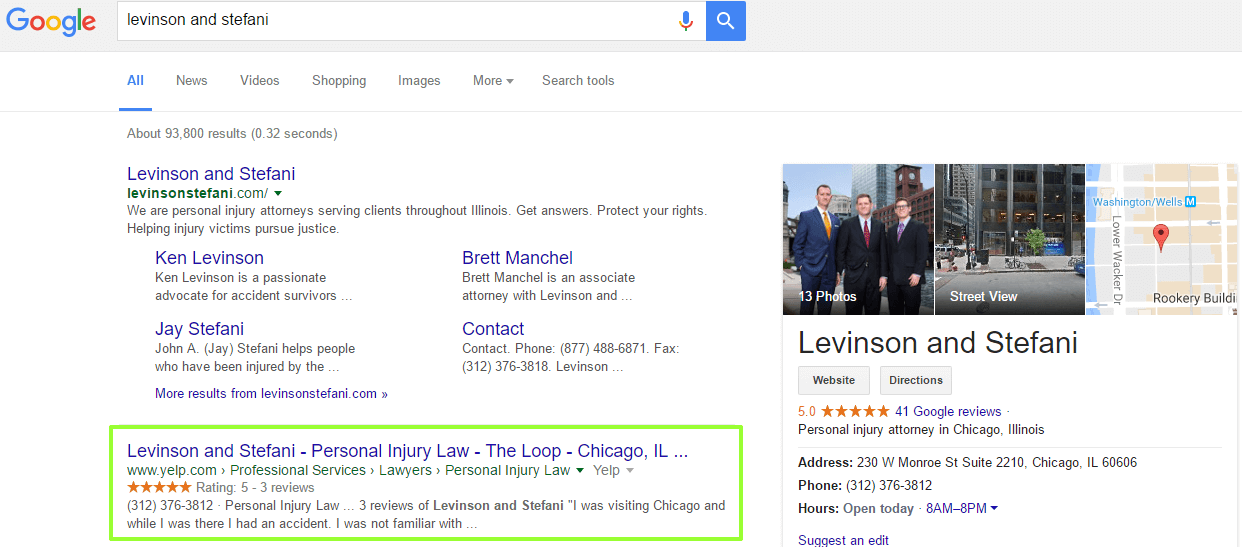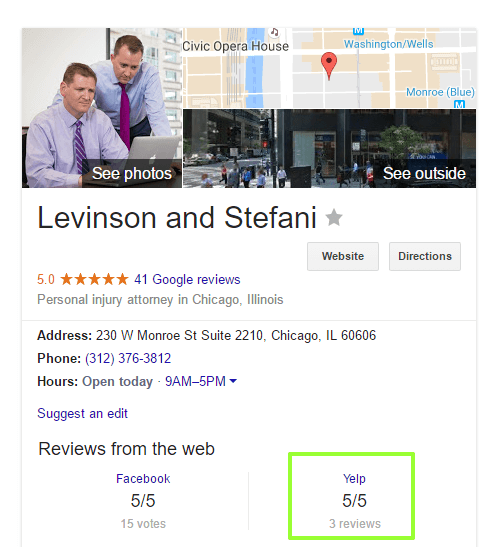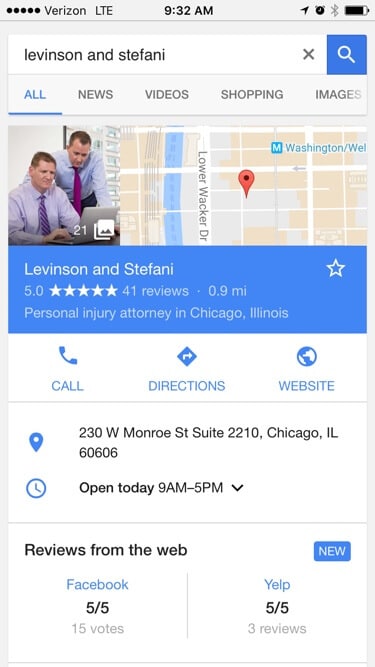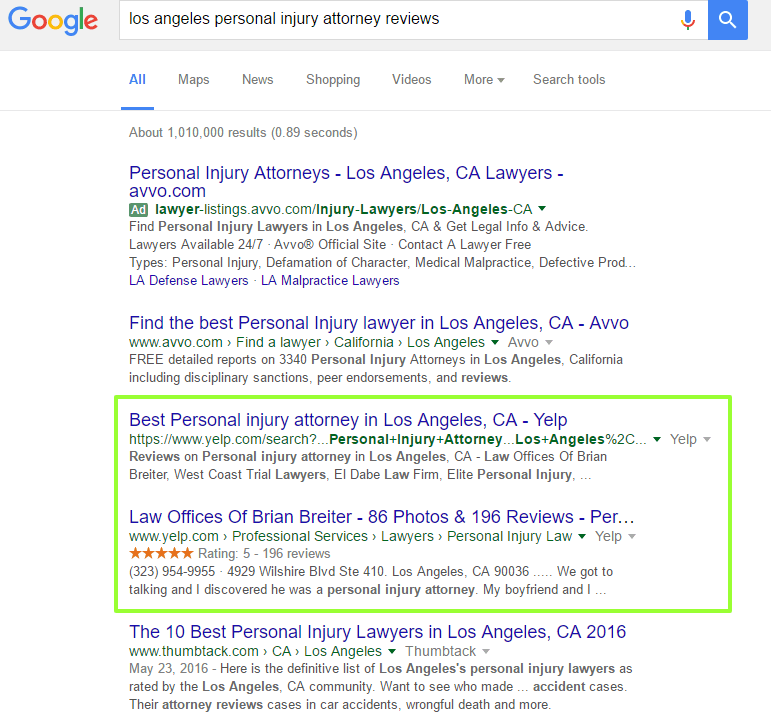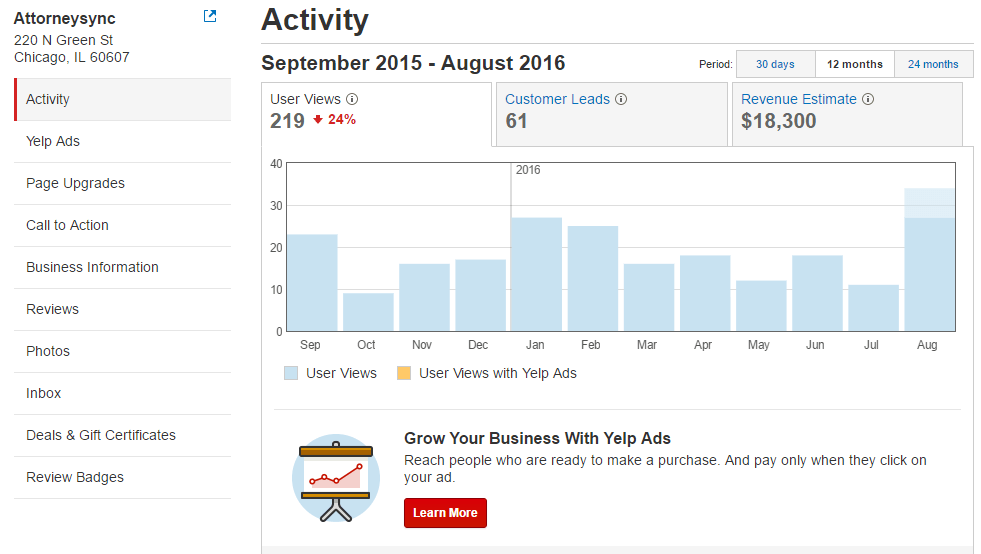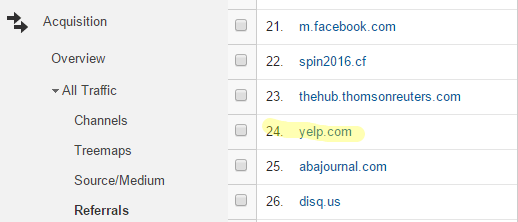No matter how your next potential client learns about you, they are likely to look you up online. And what they find (or don’t find) will play some role in their decision to contact or hire you.
Most people will turn to Google to look you up, which makes search results part of the first impression you make. And search results probably mean Yelp.
Yelp Is Likely to Rank Highly In a Search for Your Name
If you perform a search for your name or your firm’s name, Yelp will probably appear prominently in the results. Here’s an example for a search on Levinson and Stefani:
As you can see, the firm’s Yelp listing appears second only to the firm’s website.
Google also recently introduced reviews from the web to their local knowledge panels, and that includes Yelp reviews. Here’s an example from a desktop search:
Here’s that same search on a mobile device:
That’s some serious screen real estate. Clearly, Yelp is likely to play a role in the initial impressions formed by potential clients.
Due to its prominence, Yelp is also likely to be one of the first places that unhappy clients (and others) go to log their complaints. Therefore, monitoring and managing your Yelp listing can also play a role in reputation management defense.
Yelp May Rank for Searches Relevant to Your Practice
In addition to searches on your name, Yelp tends to rank prominently for geographically specific legal queries:
This makes Yelp useful for earning attention from searchers who don’t yet know your name.
Yelp Is a Player in the Local Search Ecosystem
Search engines rely on other sites for data on local businesses. They use this data as part of their algorithmic soup in displaying which law firms appear in local search results.
Put simply, making sure that your firm’s name, address, phone, and other relevant information is complete and accurate across the web plays a role in whether your firm will show up in relevant local search results. (If you’re new to local search, head over to Moz’s Local Learning Center.)
How to Use Yelp at Your Law Firm
Before we dive into what to do with Yelp, it’s worth noting that there are a variety of ethical considerations relating to a lawyer’s use of Yelp. Some of the most obvious examples include:
- Confidentiality of client information.
- False or misleading communications about a lawyer or a lawyer’s services.
- Limitations on advertising.
- Communication of fields of practice and specialization.
With regard to those issues, and at the risk of stating the obvious:
- Don’t reveal client confidences.
- Don’t lie or mislead (including paying for fake reviews).
- Don’t claim you are a specialist when you’re not.
Admittedly, the ethics issues can be nuanced. So if you are unsure, check with your bar or an experienced ethics attorney.
Finally, you may conclude that using Yelp is more headache than it is worth. Unfortunately, whether or not you appear in Yelp may be outside of your control. For example, Yelp doesn’t remove business pages, even on request. Therefore, if you are already in Yelp, at the very least you ought to regularly monitor your listing.
Claim Your Law Firm’s Page
The first step in taking control on Yelp is finding and claiming your firm’s business page. If Yelp can’t find your firm, you may want to add your business here. Be particularly careful to list your name (firm name), address, and local phone number. The consistency of these is critical to ranking in local search results. If your firm has multiple office locations, be sure to claim each additional location page.
Yelp Business Owners Dashboard
Once you’ve claimed your business page, you can access your business dashboard. This is one way to measure the impact your Yelp listing is having on your client development efforts.
The dashboard provides activity information for your business listing including:
- User views. A measure of how many times your page was accessed or viewed on Yelp’s website, mobile website, and mobile apps.
- Activity feed. Activities such as phone calls, website clicks, and directions that originate from someone accessing Yelp.
- Customer leads. Including check-ins, mobile calls, and messages to you.
- Revenue estimate. A very loose estimate the impact of Yelp users on your business’s revenue.
In addition to Yelp’s dashboard, you should also track referral traffic from Yelp to your firm’s website in Google Analytics.
By configuring goal conversions, you can also track potential client inquiries on your site (such as phone calls and form fills) that can be attributed back to Yelp.
Yelp Ads
In addition to organic listings, Yelp is also an advertising platform—that’s how it makes money.
Like many other legal advertising options, the performance of Yelp ad campaigns can vary wildly. Juris Digital’s Casey Meraz (@CaseyMeraz) has written-up a useful review of Yelp advertising.
If you’re considering paying for Yelp ads, here are some questions you should answer:
- Does Yelp appear prominently for a variety of searches related to my practice?
- Are my firm’s listings/ads competitive (i.e. more positive reviews, competitive offers, etc.).
- Are the type of clients I want using search engines and Yelp to find and hire lawyers like me?
If you answered these questions in the affirmative and are inclined to give Yelp ads a try, set specific performance targets in advance. Monitor your campaign carefully. If, after several months, you don’t realize a positive return on ad spend (ROAS) in the form of profitable client fees, stop wasting your money.
Page Upgrades
In addition to advertising, Yelp offers business owners a variety of ways to enhance their pages:
- Remove competitors’ ads from your page.
- Choose which order photos show on your page.
- Add a call to action button.
Of course these all cost money. The relative value of these primarily depends on how significant a role Yelp plays in your client development. In other words, if many of your potential clients find you through Yelp, it probably makes sense to remove competitor ads from your page. Again, this is going to vary widely from one firm to the next.
Deals and Gift Certificates
Yelp allows you to offer these, but I’m not big on deals and gift certificates for lawyers. In my experience, they tend to attract the wrong attention. Depending how they’re structured, they also may not pass ethical muster. I do know of some lawyers who have had success with offering deals or coupons, but not on Yelp.
Yelp Content Guidelines and Your Law Firm
Yelp has a variety of guidelines for contributing content. Perhaps most notably, Yelp strongly discourages businesses from soliciting Yelp reviews. However you may feel about this policy, you shouldn’t publicly request reviews for your Yelp page. If you do, you put yourself at risk of Yelp taking action on your page, including filtering your reviews. Further, depending on your state’s rules, how you encourage clients to leave reviews may also have ethical implications. Hopefully this is obvious, but you should never offer compensation in exchange for reviews or review your own firm (that includes having employees review your firm).
For better and worse, Yelp is likely to play some role in how potential clients form an opinion about you and your practice. At a minimum, you should pay attention to what is being said about you there. For those of you looking to marshal evidence of your good reputation, Yelp should probably be on your short list.
Share Article
Last updated July 21st, 2023
